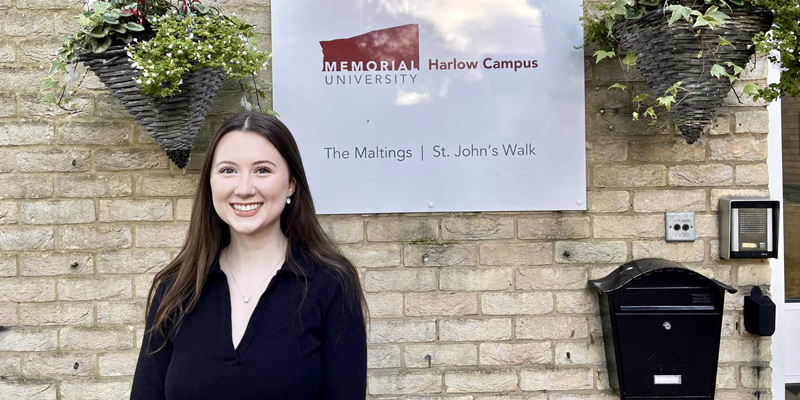Supporting startups

The last in a series of six student accounts of their commerce program work terms based at Harlow Campus.
Imagine packing up your life, leaving your loved ones, and moving to another country to work in a new field without knowing the challenges that may lie ahead. That was my reality.
For the past three months, I lived in the U.K. and worked remotely for a Newfoundland and Labrador-based, med-tech startup company, PragmaClin.
I’m sharing my experience with hopes of motivating any student or startup looking to enter a new market.
Progress to date
While in the U.K., I created connections to advance the growth and presence of PragmaClin internationally.
I registered the company as a U.K. organization, built partnerships with academic institutions and networks and bridged those connections to advance research and development initiatives.
My efforts resulted in a partnership with King’s College London and King’s College Hospital, where they will be running a validation study for PragmaClin’s PRIMS software in the new year.
My current objective lies in sourcing funding to run the study.
International market entry
The first step of integrating a company internationally is to learn about the industry’s environment.
The greatest challenge was learning about the U.K.’s health-care industry, the National Health Services (NHS).
While Canada and the U.K. both have free public health-care systems, the NHS is more complex.
The NHS is an umbrella system that is divided into a series of organizations that work at a local and national level, each of which follows a set of best guidelines and practices but with varying rules and regulations.
The NHS has networks and supports to adopt digital technology into their health-care practices, making it the perfect place to integrate new devices.
Through trial and error, I found the best way to learn about an international environment is to research and speak to those who have experience working in the system first-hand.
Through this process, I’ve had the pleasure of working with Imran Haq, a consultant of Ignite Life Sciences.
Working with a consultant has been helpful in creating connections in a foreign market. Mr. Haq connected PragmaClin to the team at King’s College.
After our initial in-person conversation, I followed up with the team to schedule a virtual meeting time. Meeting in person and virtually to organize the validation study helped to build our relationship with the institution.
While searching for funding and making connections internationally, I frequently received many unfavourable responses.
When this happens, it’s important to not get frustrated and to continue reaching out.
There will come a time when someone will be interested in your product or service.
During in-person networking sessions, my advice is to make an effort to speak to everyone in the room.
You can learn something new from each individual, and they may have access to connections you never thought of.
Advice for students
Culture shock is real when moving to a foreign market as a startup or as a student.
An awareness of cultural differences, especially in communication, could make or break building your network or creating leads.
Some areas in communication to keep in mind include accents, mannerisms, interactions, off-limit topics, cold messaging and sarcasm.
In my experience, working remotely in a different time zone meant I was starting the work day while the rest of the team was still asleep.
I had to hold off on asking questions, keep myself occupied and problem-solve.
On the other hand, the team continued working after I clocked out, often sending me messages after hours.
Meeting in different time zones came with challenges, too. You have to find a time that works for everyone. Often, that meant meeting late in the evening. To create a positive work-life balance, I adjusted my hours the following day.
As a business student working in the med-tech field, I experienced impostor syndrome.
There were times in conference rooms when the material felt too science-based and advanced for my background and education.
I learned that in those times, you should focus on the areas where you excel.
In my case, I was able to share my knowledge in business to aid the startup company.
It has been a rewarding experience working for a company in the pre-revenue stage.
I’ve seen the behind-the-scenes of creating a new device/software, and the research and development that is done before entering the market.
I found that in working for an early-stage company, my work was highly valued and my voice was heard.
I urge any work-term student to break out of their comfort zone and try an international work experience or a new industry.
Keeping your options open can create many possibilities.
If I had it in mind to work in the province for the semester, I wouldn’t have applied to PragmaClin and would have missed out on this amazing work and travel experience.
Missing your loved ones can be difficult, but you will be rewarded with a newfound independence, appreciation and outlook on the world.
As I continue my career as a young business professional, I will always look back on this experience and be grateful for what it has taught me in the areas of communication, entrepreneurship, startups, international business, med-tech and so much more.
Harlow Campus is positioned in the U.K.’s Innovation Corridor, a leading sci-tech region between Cambridge and London.
Emily Gagné-Hedderson is a Faculty of Business Administration commerce student who spent the 2022 fall semester working remotely on a med-tech exchange at Memorial’s Harlow Campus in the U.K. The initiative is a partnership with Bounce Health Innovation and Harlow Campus.